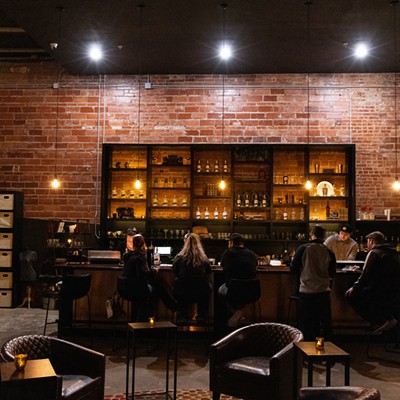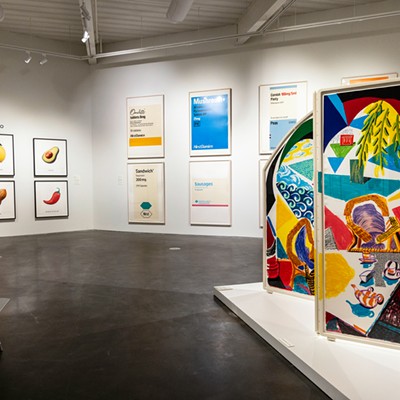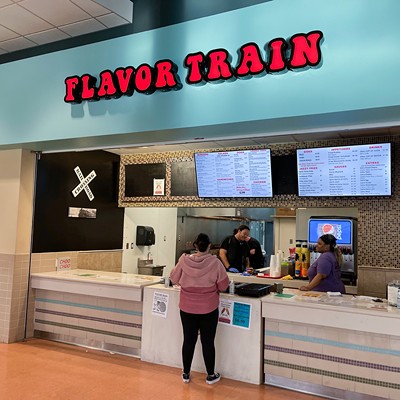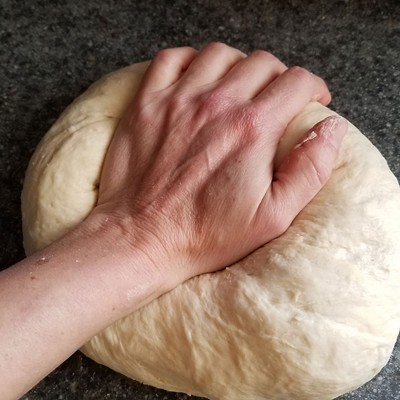Make the
Far East your first stop at Fung’s Kitchen, 3231 N. Classen Blvd., which
serves seven days a week everything Chinese. Named for the Chinese city
of Fung, this is a chance to try authentic items cooked fresh to order
(note: no buffet here). They offer two menus: One caters more to typical
American tastes, while the other reflects traditional Chinese
selections.
Duck lovers should indulge
in the Peking duck, served with three courses. Don’t be alarmed when you
see the ducks hanging in the glass case near the front entry. While
it’s a sight that you won’t see in most other restaurants in town, this
is the classic way the duck is displayed in China. A whole order
accommodates 10 people for $35.95.
Another
delicacy is duck tongue ($14.95). It is deep-fried or stir-fried in
jalapeño oil. The tongue is crispy and well-seasoned, balanced perfectly
with pepper and salt.
Seafood comes into the
picture, too. Shark fin and crab meat soup is one of the house
specialties. This soup combines the shark’s colorful flavor with the
crab meat’s heartiness. Because of its rarity, the price is based on
seasonal availability and starts at $43.95 for a portion that feeds
about four people.
Moving
south to Malaysian cuisine, Banana Island, 1117 N.W. 25th, offers a
fresh dining approach. Manager Michael He believes this lighter fare is a
nice alternative to heavier, greasier meals.
right, Lamb curry and pineapple shrimp at Banana Island.
“We
make healthy food,” he said. “We use fresh mango with chicken, shrimp,
beef [plus] pineapples and coconut milk (for our dishes).”
He
explained that Malaysian cookery is based on a mixture of influences
from nearby countries such as India, Thailand, Indonesia and China. Thai
sauces tend to be bit spicier in contrast to some of the Malaysian
ones, which have a little kick but also have hints of tartness.
There are more than a dozen entrée choices that include chicken, beef, lamb, seafood and vegetables.
The beef or lamb randang ($14) is a standout. The plate is simmered with tender pieces of meat,
cinnamon, cloves and lemon grass in coconut milk. The food isn’t highly
manipulated because there are no oils and MSG, but it’s thriving with
zest.
Dessert is
light and made with a cultural flare. Try the bubor cha cha ($1.50).
Yams and sweet potatoes are steamed, then added to a coconut milk soup
and sweetened with palm sugar.
Queen of Sheeba, 2308 N. MacArthur,
virtually transports diners to the distant streets of Addis Ababa. Get
ready to pass the injera (a moist bread) and inhale a powerful bouquet
of spices at this most unassuming Ethiopian restaurant located in a
strip mall.
Owners
Begib and Mimi Younis are terrific about sharing the cultural customs
of their homeland. When dining in the African nation, they explain, the
ritual of breaking injera and sharing food from a common plate displays
the ties of loyalty and friendship.
Various
dishes are decoratively placed around injera. Subsequently, diners tear
off pieces of the injera to scoop up mouthfuls of these family-style
dishes.
right, Brunch at LaBaguette
Akin to a soft flatbread, injera substitutes for silverware and is the foundation of Ethiopian meals.
Hearty
stews make up the majority of the meat dishes. The slow-cooked doro wat
($10.95), chicken stewed in red pepper sauce and clarified butter to
achieve the powerful flavor, is a standard offering.
Plenty of vegetarian dishes are presented, too.
Try
the salad. The komodor fetfet ($10.95) is a cold, tangy combination of
vine-ripened tomatoes, garlic, onions and green pepper. On the fiery
side, try the lentils in the spicy berbere sauce ($10.95).
“Everybody loves it,” said
chef Mimi Younis. “People have gone around the world and tried the
lentils (but it’s not the same). I cook it different and people come to
eat it.”
Meat- and veggie-eaters will both be satisfied with the sampler meal.
Drinking
can be a bit of an adventure, too. Sip on the honey wine. A variety is
produced especially for the restaurant, made from raw honey before it’s
cooked with hops and a white wine. This is not listed on the menu, so be
sure to ask for it.
Mimi recommends taking time for the coffee ceremony. The cost is $3.50 per person and lasts 45 minutes.
“We
brew for them Ethiopian coffee in a clay pot,” said Mimi. “We have
small little cups for each person. The most important thing about it is
family and friends gathering.”
Photos by Shannon Cornman











